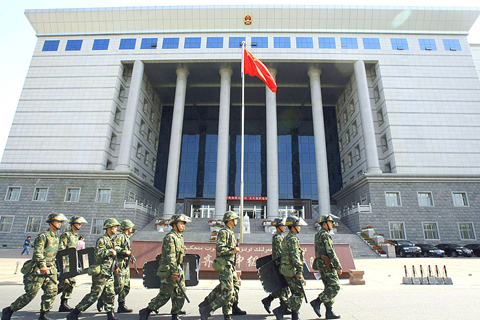A court in Xinjiang has tried and sentenced three suspects accused of joining in an outburst of needle-stabbing that ignited sometimes deadly riots and deepened ethnic divisions in the tense frontier region.
The Intermediate Court of Urumqi yesterday announced jail sentences of up to 15 years against the suspects — the first to appear before a judge over the scare — the Xinhua news agency reported.
Muhutaerjiang Turdi, a 34-year-old man, and Aimannisha Guli, a 22-year-old woman, were jailed for 10 years and seven years respectively. They were accused of using a syringe to threaten a taxi driver into giving them 710 yuan (US$103), Xinhua reported.

PHOTO: REUTERS
In a separate trial in the same court, Yilipan Yilihamu, 19, was sentenced to 15 years on a charge of “spreading false dangerous substances.”
He was accused of jabbing a woman with a pin while she bought fruit at a stall, Xinhua said.
The report said the defendants were Uighurs.
Urumqi has been struggling to return to order after panic and protests over claims that Uighurs used syringes to attack residents, especially members of China’s Han ethnic Chinese majority, who many Uighurs see as an unwelcome and growing presence in the region.
TIBET
Meanwhile, a British minister underlined London’s support for greater Tibetan autonomy on an unprecedented visit to Lhasa last week.
Junior Foreign Office Minister Ivan Lewis visited China from Monday to Thursday and made the first ever trip to Tibet by a British government member, 18 months after an internationally criticized Chinese crackdown in Tibet.
“This is a historic visit,” the office quoted him as saying on Friday, adding that it was in the context of “our decision to change UK policy, and the significant international concern following the events in March 2008.”
“We recognise Tibet as an autonomous region of China ... But long-term stability can only be achieved through respect for human rights and greater autonomy,” the statement quote him as saying.
“This depends on substantive dialogue between the Chinese government and the representatives of the Dalai Lama,” he said.
In Tibet, Lewis met the chairman of the Tibet Autonomous Region and the Drepung Monastery.
Ahead of the visit, pro-Tibet campaigners urged Lewis to speak out against China’s rule of the Himalayan territory and human rights abuses there.

WAITING GAME: The US has so far only offered a ‘best rate tariff,’ which officials assume is about 15 percent, the same as Japan, a person familiar with the matter said Taiwan and the US have completed “technical consultations” regarding tariffs and a finalized rate is expected to be released soon, Executive Yuan spokeswoman Michelle Lee (李慧芝) told a news conference yesterday, as a 90-day pause on US President Donald Trump’s “reciprocal” tariffs is set to expire today. The two countries have reached a “certain degree of consensus” on issues such as tariffs, nontariff trade barriers, trade facilitation, supply chain resilience and economic security, Lee said. They also discussed opportunities for cooperation, investment and procurement, she said. A joint statement is still being negotiated and would be released once the US government has made

Authorities have detained three former Taiwan Semiconductor Manufacturing Co (TMSC, 台積電) employees on suspicion of compromising classified technology used in making 2-nanometer chips, the Taiwan High Prosecutors’ Office said yesterday. Prosecutors are holding a former TSMC engineer surnamed Chen (陳) and two recently sacked TSMC engineers, including one person surnamed Wu (吳) in detention with restricted communication, following an investigation launched on July 25, a statement said. The announcement came a day after Nikkei Asia reported on the technology theft in an exclusive story, saying TSMC had fired two workers for contravening data rules on advanced chipmaking technology. Two-nanometer wafers are the most

NEW GEAR: On top of the new Tien Kung IV air defense missiles, the military is expected to place orders for a new combat vehicle next year for delivery in 2028 Mass production of Tien Kung IV (Sky Bow IV) missiles is expected to start next year, with plans to order 122 pods, the Ministry of National Defense’s (MND) latest list of regulated military material showed. The document said that the armed forces would obtain 46 pods of the air defense missiles next year and 76 pods the year after that. The Tien Kung IV is designed to intercept cruise missiles and ballistic missiles to an altitude of 70km, compared with the 60km maximum altitude achieved by the Missile Segment Enhancement variant of PAC-3 systems. A defense source said yesterday that the number of

Taiwanese exports to the US are to be subject to a 20 percent tariff starting on Thursday next week, according to an executive order signed by US President Donald Trump yesterday. The 20 percent levy was the same as the tariffs imposed on Vietnam, Sri Lanka and Bangladesh by Trump. It was higher than the tariffs imposed on Japan, South Korea and the EU (15 percent), as well as those on the Philippines (19 percent). A Taiwan official with knowledge of the matter said it is a "phased" tariff rate, and negotiations would continue. "Once negotiations conclude, Taiwan will obtain a better